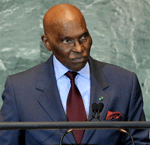Senegal
|
Published on Fri, 2012-03-16 10:17
In terms of gender equity Senegal lags slightly behind the Sub-Saharan African average, and also below some of its neighbours. |
Published on Tue, 2012-02-07 07:56
The civil society organizations gathered in Social Watch Benin invited the incumbent President of Senegal, Abdoulaye Wade, who is seeking a third term in office, “to take a peaceful retirement,” the network said in a statement published on Thursday. |
|
Senegal has been hit hard by the world economic crisis and it is faced with serious difficulties including a lack of transparency in State institutions and a lack of long term planning. This has made the country more vulnerable to natural disasters, but the Government has no effective plans to cope with these or to protect the population.
Another serious challenge is deforestation, which is mainly due to the demand for fuel, and it is an ecological time bomb. Social unrest is on the increase and in the last year various sectors of society have taken to the streets in demonstrations calling for adequate governance.
|
|
Published on Thu, 2010-11-25 08:36
|
|
Senegal faces a number of problems that are reducing its chances of reaching the Millennium Development Goals (MDGs) by 2015. Poverty is increasing, with over 60% of the population currently living in poverty or extreme poverty. The health and education systems are inadequate and water and sanitation services cannot meet people’s needs. Despite some progress towards gender equality, the country is still a long way from reaching the relevant targets, including: education, employment, reproductive health or political representation, which requires far-reaching structural changes.
|
|
As the most food-import dependent country in West Africa, Senegal faces several challenges as a consequence of the multiple global crises which affect the economy, finance, environment, energy and, of course, food. All of these challenges result in the decline of the quality of life of Senegal’s citizens – particularly amongst the more vulnerable sectors – because of their repercussions on the country’s scant production, diminished imports and the high price of basic products. The Government’s plans do not provide an adequate response to the country’s needs. Civil society proposes returning to traditional agriculture, duly encouraged and supported by the State.
|
SUSCRIBE TO OUR NEWSLETTER


 The International Council of the World Social Forum met in Dakar and discussed the organization and program of the next WSF that takes place in Senegal, 6-11 February 2011. Social Watch will organize several activities including the presentation of the 2010 Report in French and Arabic. Learn more on how to participate in the WSF.
The International Council of the World Social Forum met in Dakar and discussed the organization and program of the next WSF that takes place in Senegal, 6-11 February 2011. Social Watch will organize several activities including the presentation of the 2010 Report in French and Arabic. Learn more on how to participate in the WSF.

